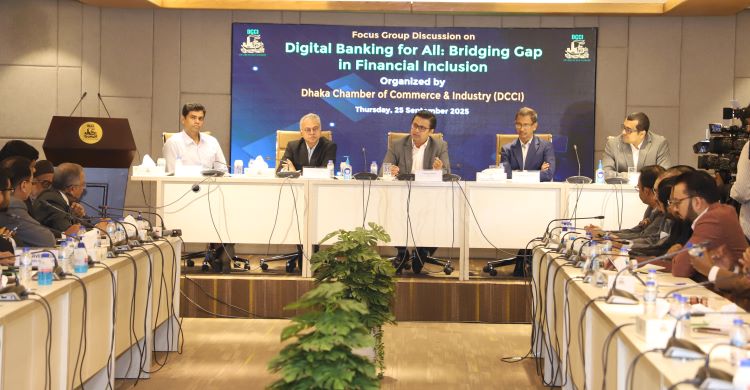News Flash
News Flash

DHAKA, Sept 25, 2(BSS) – Experts at a discussion today laid emphasis on formulating supportive policies, increasing trust among users and ensuring adequate infrastructure for fully capitalized the promising potential of digital banking.
Despite the promising potential of digital banking in the current era of information technology, they observed that Bangladesh has not been able to fully capitalize this opportunity due to the absence of supportive policies, lack of user trust, inadequate infrastructure, poor coordination among regulatory bodies, and the high cost of necessary devices.
They made the observation at the focus group discussion on “Digital Banking for All: Bridging Gap in Financial Inclusion” organized by Dhaka Chamber of Commerce and Industry (DCCI) at DCCI auditorium in the city.
Shish Haider Chowdhury, Secretary of the ICT Division, and Dr. Md. Ezazul Islam, Executive Director of the Bangladesh Bank, joined the event as the chief guest and special guest respectively.
Joining the event virtually, Shish Haider Chowdhury stated that the government, private sector, and academia are working jointly to modernize and expand the scope of digital services in the country.
He highlighted that the government has set four priorities—integration, accessibility, interoperability, and scalability to digitalize the banking sector.
He further noted that improper registration processes had exposed the data of 50 million citizens to the dark web, stressing the importance of robust data encryption and enhanced monitoring.
As the required infrastructure, human resources, and facilities for digital banking already exist, he assured that the government would provide all necessary policy support to implement digital banking for all citizens.
The secretary also highlighted that the government is making concerted efforts to deliver all citizen services through a one-stop service platform, noting that citizens in the capital are already availing 10 such services.
He also informed that the government is undertaking initiatives to introduce a Personal Data Protection Ordinance, expected to be finalized within a month.
Dr Md. Ezazul Islam said that Bangladesh has made significant progress in financial services such as debit, credit, deposit, insurance, and payment services, and more citizens should be included in this ecosystem.
He shared that as of August this year, total money circulation reached Taka 31.5 trillion, of which Taka 22.7 trillion remains outside the banking channel in people’s hands, while the banks hold only Taka 2.9 trillion.
He also noted that to date, only 27–28% of financial transactions have been carried out digitally, while more than 70% continue to be processed through traditional, non-digital channels.
In his welcome remarks, DCCI President Taskeen Ahmed said that although Mobile Financial Services (MFS) were introduced in Bangladesh in 2011, only around 54% of the population are currently using this facility.
“MFS has enabled users to access wide range of financial services more easily. However, due to various challenges such as cyber security risks, lack of consumer protection, and trust deficit, the potential of this sector has not yet been fully realized,” he added.
He stressed on the need for making digital services more affordable, enhancing financial and digital literacy, and strengthening coordination among banks, fintech companies, and regulatory bodies.
The DCCI president further highlighted that trust and security are intrinsically linked with digital financial services and the relevant authorities should provide top priority in this regard.
In his keynote presentation, Head of Commercial Partnership of the Robi Axiata PLC Sanjid Hossain stated that in 2025, the digital banking market in the Asia-Pacific region is valued at $4,678.47 million, which is projected to grow to $11,238.6 million by 2033.
He urged to utilize the lack of trust in conventional banking system an opportunity for the growth of digital financial services.
He observed that Bangladesh’s digital banking has the potential to reach $30 billion.
However, he cautioned that unless a comprehensive cyber security ecosystem is established, the sector may face risks.
He stressed the need for stronger central bank monitoring and for expanding access to smartphones and the internet to the users residing in remote areas.
DCCI Senior Vice President Razeev H Chowdhury, Vice President Md. Salem Sulaiman, members of the board of Directors, and entrepreneurs from relevant sectors were also present on the occasion.